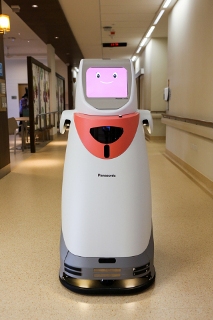Jul 25 2015
In line with the country’s goal of becoming a Smart Nation, Panasonic System Solutions Asia Pacific (PSSAP) and Changi General Hospital (CGH) are implementing assistive robotics technology to improve operational efficiency of a hospital.
 Autonomous delivery robot, HOSPI delivers (up to 20kg) goods such as medicine, medical specimens and case files within the hospital (Photo: Business Wire)
Autonomous delivery robot, HOSPI delivers (up to 20kg) goods such as medicine, medical specimens and case files within the hospital (Photo: Business Wire)
Experimental use of the Panasonic autonomous delivery robots, HOSPI, began in February 2015 and they are being implemented in phases. CGH is the first hospital outside of Japan to utilise HOSPI. As part of the hospital’s porter management system, the four HOSPI are able to deliver fragile and bulky medicine, medical specimens and patients’ case notes 24/7, easing manpower constraints.
HOSPI is equipped with security features to prevent tampering, theft and damage during delivery. The robot’s contents can only be accessed with ID cards. Automation enables HOSPI to move around using the lifts and between facilities in CGH’s Main Building and The Integrated Building on its own, delivering medicine and specimens.
Rubina Gan, Assistant General Manager, PSSAP, noted, “Singapore has often been dubbed a ‘living laboratory’ for companies to experiment and co-create solutions. Panasonic is excited to work together with Changi General Hospital to phase in our HOSPI robots for full deployment so that eventually medical caregivers’ time is freed up for dedicated patient care and treatment. CHART’s (Centre for Healthcare Assistive and Robotics Technology) opening cements how technology and solutions can play a key role in healthcare in the future.”
HOSPI is equipped with sensors and programmed with the hospital’s map data to avoid obstacles such as patients in wheelchairs and complete deliveries with minimal supervision. New hospital routes can be programmed in advance, allowing flexibility. The autonomous robot communicates and relays information on its whereabouts to the control centre, enabling its location to be monitored and recorded at all times.
Selina Seah, Assistant Chief Executive Officer, Changi General Hospital, commented, “HOSPI can help us save manpower and time in a simple and practical way especially with the challenges we are facing with an aging workforce whilst our healthcare facilities increases in size and distance. By harnessing autonomous technology like HOSPI, we can optimise our workforce and improve productivity. We welcome Panasonic as a CHART partner to work with us to innovate healthcare operations and patient care.”
Panasonic is also test-bedding the use of Reysone, an electric care bed that separates and converts into a wheelchair safely and conveniently, at CGH. This 2-in-1 care bed not only facilitates the transfer and movement of patients, but also eliminates the need for additional storage areas. The Reysone test-bed will run for six months.
By continuing to build a solid foundation for healthcare robotics, Panasonic aims to deploy HOSPI to other local hospitals in the future.
Source: http://panasonic.net/